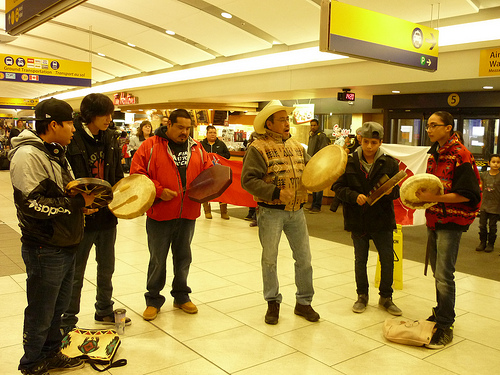Change the conversation, support rabble.ca today.
The eminent British literary scholar Terry Eagleton points out “nobody has ever changed a world they didn’t understand, and this is where intellectuals have a role to play.”
Eagleton is doing more than rephrasing the famous reprimand of Karl Marx to philosophers who had only tried to understand the world, when the task was to change it. His Red Pepper article is entitled ‘Death of the Intellectual,’ and Eagleton shows how British universities are failing to produce public intellectuals, leaving that role to brave writers and artists.
In Canada #IdleNoMore has called for writers and academics to contribute their work on colonialism and native sovereignty to its website. Building support requires action and reflection. Each supports the other.
The most prominent spokesperson for #IdleNoMore is Dr. Pamela D. Palmater, a Ryerson academic, and former candidate to be National Chief of the Assembly of First Nations. Palmater provided fellow activists with the context for the Idle No More actions, and documented the concerns that First Nations peoples have with the Harper governments attack on the environment, and Aboriginals.
Idle No More is bringing forward important new voices, including an eloquent 11-year-old, and UBC doctoral student David Moscrop.
Nora Loreto, a rabble.ca contributor, has shown how mainstream media have serious problems covering social movement stories. With a lag, and pushed by its twitter followers, CBC television assigned journalist Adrienne Arsenault to report the story. Most mainstream outlets have followed suit. Some like Maclean’s have given space to a voice such as David Newland, sympathetic to #IdleNoMore.
To its credit the self-styled national newspaper published a letter on #IdleNoMore from Judy Rebick calling its coverage “idle no … mention?” To its discredit, the Globe amplified a PMO orchestrated leak to the CBC, a blatant attempt to discredit hunger striking Chief Theresa Spence and her Attawapiskat Band, using partial stories about incomplete financial records.
Public figures upset by the antics of the Harper government, on a range of issues, include a prominent Conservative, Allan Gregg in a speech last September entitled The Assault on Reason, and a former top journalist at the Globe, Michael Valpy, writing in the Toronto Star. Richard Van Loon, a former Associate Deputy Minister of Indian Affairs (and former President of Carleton University) recently provided a survey of how public policy has generated legitimate grievances among First Nations peoples that have never been properly addressed.
Social movements are driven by injustices. On this basis Canada’s First Nations people had every reason to go into overdrive when the Harper Conservatives decided to do away with important legislation protecting the environment in its omnibus (bogus) budget legislation Bill C-45.
Not hiding their prejudice, Conservatives have tabled private members bills aimed at disbanding Aboriginal governments, and allowing reserve lands to be privatized. Since 2006, Harper Conservatives have reduced funding for the Assembly of First Nations by 60 per cent.
The grassroots action movement that is Idle No More began with four women — Nina Wilson, Sylvia McAdam, Jessica Gordon and Sheelah McLean (Indigenous and non-Indigenous) — in Saskatoon.
Local organizing led to a successful December 10, 2012 national day of action. Cree Chief Theresa Spence began her hunger strike on that day in solidarity with the grassroots call for action in support of Indigenous peoples launched in Saskatchewan. Chief Spence has received important attention and support, including from former prime ministers Joe Clark and Paul Martin. Meanwhile, various attempts underway in the right-wing media to diminish her protest, and question her integrity, prove the importance of her action.
As a movement, #IdleNoMore welcomes participation by Chiefs, but it is entirely separate from the traditional leadership represented by the Assembly of First Nations. Idle No More speaks for itself. The movement features flash mob round dances, welcomes demonstrations of support, and its calls for solidarity with ‘Mother Earth’ are something anyone can understand.
Road and railway blockages have begun, and represent a serious problem for the Harper government. Recognizing this, the prime minister has agreed to a hastily convened meeting with the AFN on January 11. Idle No More has responded by calling for a national and global day of action.
After diminishing the AFN leadership, Harper now wants to get them on board so that he can attack Idle No More in the same way his government repressed legitimate dissent at the G20 summit in Toronto — with force.
Duncan Cameron is the president of rabble.ca and writes a weekly column on politics and current affairs.
Photo: marygkosta / flickr



